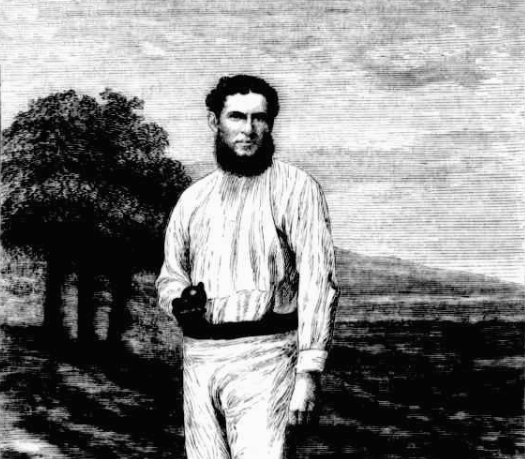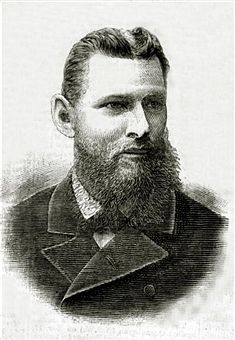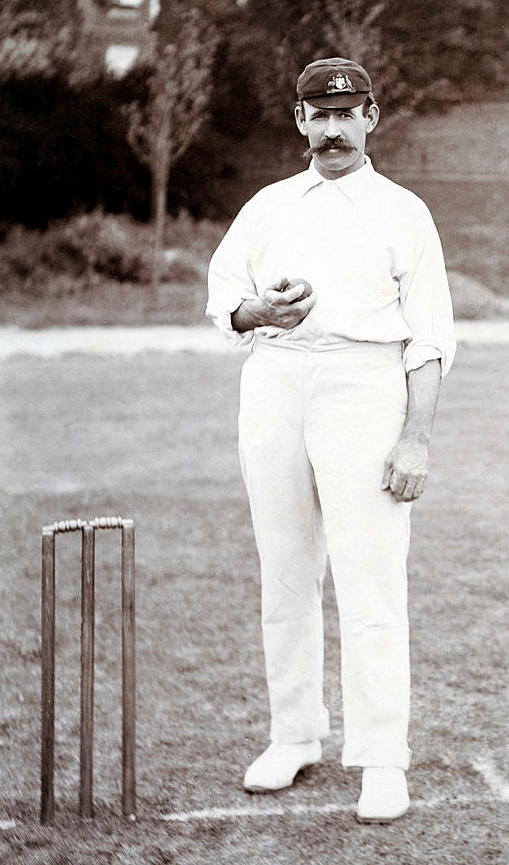Early heroes - Penrith Cricket Club
Penrith Cricket Club | May 12, 2024

When Nepean played Lord Sheffield’s Englishmen some of the local ‘name’ players were William Peter Howell, known as ‘Bill’ or ‘Farmer Bill’, who would play for NSW and Australia; James Oatley Cleeve, who would play for NSW in an Inter-colonial match in 1882 v Victoria; and, the earliest recorded Nepean District player to play First-class cricket (1874), Edwin ‘Ted’ Evans.
Penrith Panthers are proud sponsors of Penrith Cricket Club
Edwin Evans

Edwin Evans was born at Emu Plains on 6 March 1849 (died at Walgett 2 July 1921) and, from 1874 to 1884, he was second only to C.T.B. Turner (‘The Terror’) and the feared Fred Spofforth amongst all Australian bowlers. He was a talented and popular all-rounder who promised much, but turned out to be a reluctant champion. A right-hand batsman and a right-arm fast-medium bowler, he was so accurate in pitch that he was compared to Alfred Shaw (1864-97), the prolific English bowler who took 2,075 First-class wickets @ 12.00. Evans had a fine off break and could bowl all day.
When he joined NSW the team enjoyed a great measure of success, mainly through his efforts. Though he had some fine performances, notably 7/44 and 4/42 against Dave Gregory’s Australians on their way to England in 1878, he repeatedly turned down, often at the last moment, opportunities to play Inter-colonial and International cricket, including several tours of England. He provided any number of reasons, ranging from injury, family matters (he was the father of 16 children), pressure of business and even seasickness. His employment, as Inspector of Selections settled on by farmers, required him to visit country areas and this was considered the major problem. He toured England with the 1886 team, but did not meet with great success. Evans was, in reality, past his prime, being in his 38th year. Such was his contribution to the game that in 1921/22, the Nepean Association organised a subscription fund to purchase a shield to honour the memory of Evans. Since then the ‘Evans Shield’ has been awarded, continuously, to the Premiers in the NDCA A Grade Competition.
Evans played 27 matches for NSW, scored 505 runs (Ave 11.74) and took 145 wickets (Ave 14.95); played six matches for Australia, scored 82 runs and took seven wickets; in First-class matches he scored 1010 runs (Ave 12.02) and took 202 wickets (Ave 16.45). Evans still ranks third in the NSW First-class records for the lowest bowling average, 145 wickets (Ave 14.95).
Bill Howell

Bill Howell was Evans’ nephew. He was born at Penrith on 29 December 1869 (died at Castlereagh 14 July 1940) and, as a youth was a wicket-keeper for Warwick in Sydney Club cricket. Note that talent, because Howell’s career development is a classic illustration how first impressions can be misleading. It was his left-hand batting in the 1894/95 Country Week Carnival in Sydney that gained him selection in the NSW team to play A.E. Stoddart’s visiting English team that season … yet, in that game at the SCG he revealed his greatest talent, right-arm medium-fast off-cut bowling! After the regular bowlers had failed to separate Stoddart and J.T. Brown, Howell informed his captain that he thought he could get a wicket. He was given the ball, was immediately successful, and finished the innings with 5/44, all clean bowled. He became a hardworking, brisk medium pace bowler who could cut the ball both ways, vary his pace skilfully and bowl for long periods. But, those who’d seen him get five wickets against Grace’s team at Penrith a few summers earlier might have said, “told you so!”
He went to England with the 1899, 1902 and 1905 teams, and on the three tours he took 256 wickets. On the 1905 tour he clean bowled W.G. Grace for one run, an innings that incidentally was Grace’s last for England. His batting pretensions were confined to sporadic exhibitions of ferocious hitting. Batting for NSW against Stoddart’s team in 1897/98, he scored 48 in 44 minutes in the first innings, while in the second he took only 63 minutes to race to 93, dominating a last wicket partnership of 109 with Andrew Neill. In his first match in England he took all ten Surrey wickets in an innings for 28 runs. In Tests against England he took 35 wickets (Ave 35.57), and scored 143 runs (Ave 7.94). In a match against Western Province at Capetown, South Africa in 1902 he took 17 wickets for 54 runs, equalling the record number of wickets taken by a bowler in a First-class match. In Sheffield Shield Cricket he played in 36 matches, scoring 1,029 runs (Ave 22.86), and taking 159 wickets (Ave 23.55).
Some recorded observations: “While he had no grace of style, and was not a reliable run-getter, he wielded a heavy bat with a degree of power rarely equalled”. And, “As a fieldsman his hands were very big and grasping, and safe in holding catches, so that they were facetiously described as ‘carpet bags’”. And this: “He was a splendid-hearted fellow, full of endearing qualities, consequently he made no enemies in the game”. William (Bill) Howell played 48 matches for NSW and scored 1349 runs (Ave 22.11), took 195 wickets (Ave 24.07); for Australia played 18 matches scoring 158 runs (Ave 7.25), taking 47 wickets (Ave 28.71); in First-class played 141 matches scoring 2228 runs (Ave 14.85), took 520 wickets (Ave 21.45).
Howell had five sons. Three played First Grade cricket, and the eldest, William Hunter Howell or ‘Young Bill’, played 14 matches for NSW (1933-36) scoring 100 runs and taking 32 wickets @ 38.00, his best being 5/31. Victor played local cricket for both Nepean and Hawkesbury District Associations. In Sydney Grade, Norman played for St George and Cumberland (now Parramatta), Arthur and ‘Young Bill’ played for Cumberland. Greg Sheens, a great grandson of Howell, played with the Penrith Club.
James Cleeve
James Cleeve was born on 14 February 1864 (died at Moree 8 February 1909). He was a left-arm fast-medium and was the leading wicket-taker (6/72) against W.G. Grace’s team in 1892. The NSWCA records show Cleeve represented during seasons 1882/83 and 1883/84; he made his debut against Victoria in a ‘timeless match’ at the Melbourne on 23 December 1882. He went wicket-less in the first innings but in Victoria’s second bowled 72(!) overs and took 6/95 ... “on a splendid pitch”, according to observers. Newspaper reports were glowing: “Cleeve, though only a mere lad, bowled with a judgment and nerve not excelled even by the experienced ‘Demon’ (Spofforth)”. And, “In Cleeve NSW have certainly the best colt that has come forward for many seasons”. However, his career stalled. In the 1883 season it was reported: “Cleeve, probably bowling to orders, tried bowling two feet off the wicket with his field all on one side, but it was a decided failure and the colt fell far short of the splendid form he displayed in Melbourne.” James Cleeve played three First-class matches scoring 17 runs, and took seven wickets (Ave 34.00). His twin brother John Kingdon Cleeve (1864-91) was also a handy bowler.









